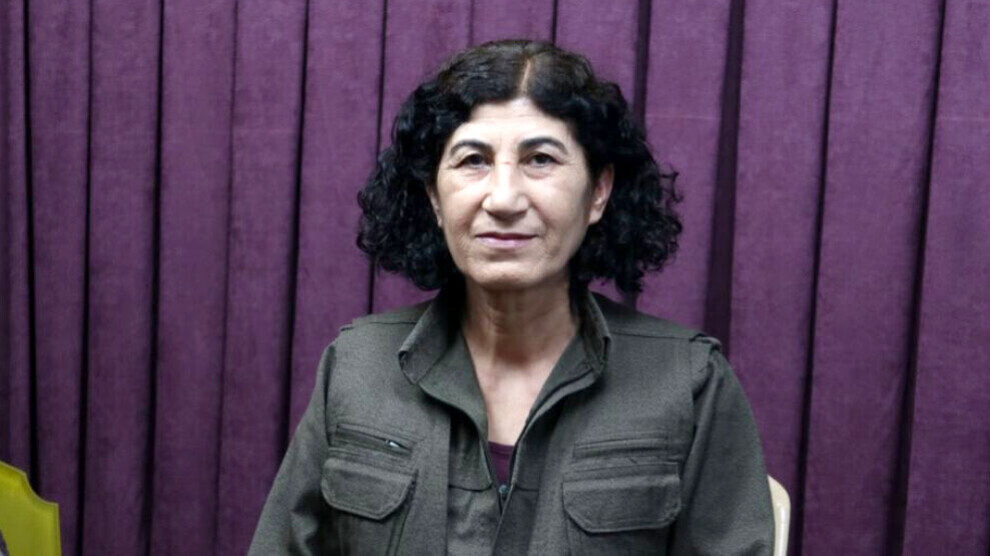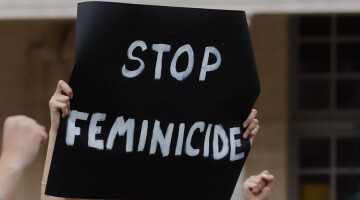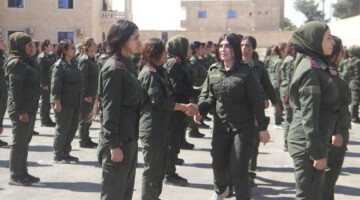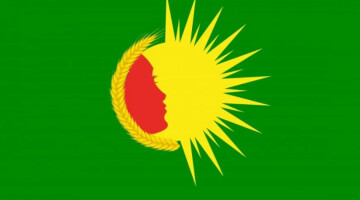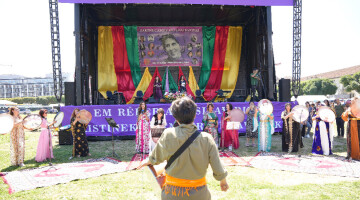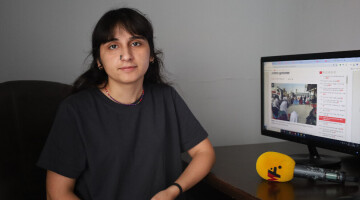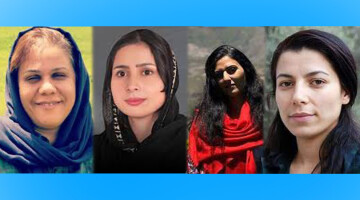Elif Ronahî from the Presidential Council of the Kurdistan Communities Union (KCK) emphasized that women's liberation is the revolutionary subject of the PKK. "Women's liberation is the cornerstone of the struggle. Women are the leaders of the non-stop struggle and the mentality revolution."
Elif Ronahî spoke with Gulan Botan of Medya Haber TV about March 8, Newroz and the importance of the women's freedom struggle. Below are some excerpts from the interview.
The actions of the Kurdish people continue full of passion. Let's start with the 8th of March. How was the women's struggle day this year?
The March 8 celebrations this year were really very passionate. In particular, it was important that these celebrations were dedicated to Abdullah Öcalan and celebrated for his freedom. In all four parts of Kurdistan, women took to the streets and squares with their own colors, their own feelings and thoughts, and most importantly, their own demands. They demand the freedom of Abdullah Öcalan. They manifested their conviction and the continuity of the struggle. This was very significant. In 2021 and early 2022, women's struggles around the world have developed significantly in terms of their scope, demands and content. Their sense of freedom has thus been clearly demonstrated. March 8 has confirmed that this century will be the century of freedom.
The struggle of Kurdish women, the construction of their own system and organization, their construction process and judgment of 5,000 years of patriarchy and its very strong historical and social aspects have created an important awareness. This is influencing the women of the world more and more. It is very important that women organize themselves, build institutions according to their needs and do not leave their self-defense to anyone else. March 8 was celebrated in a way that is very significant in itself, but also goes far beyond. The demands were made. The goals of the struggle were set.
What is the significance of Newroz to the PKK? Has the meaning of the festival changed with the PKK?
With the PKK, Newroz returned to its essence. It became a sign of rebirth again. The fact that Mazlum Doğan did not choose a day other than Newroz for his action is very significant. It is a rejection of genocide, surrender, denial, betrayal and destruction of identity. The style, the attitude, the resistance and the spirit of the PKK is to dedicate one's life to a free life with dignity. Therefore, Mazlum Doğan stands for Newroz and the spirit of the PKK.
Zekiye followed in this spirit. She was not a cadre but a student, a woman who felt in her heart what the people were experiencing. She turned her body into a Newroz fire on the walls of Amed (tr. Diyarbakır). She erected the freedom torch on this wall. Since 1990, this torch has never been extinguished.
In 1992, Rahşan became a new heiress of this spirit in Kadifekale, Izmir. She showed us that no force can stop Newroz, that we will celebrate the resistance day by setting our bodies on fire if necessary. She was not a cadre either. She was a patriot in exile who showed her willingness to sacrifice. As an exiled Kurdish young woman in the Turkish metropolis, she built a bridge of struggle between the Kurdish people and Kurdistan.
In 1994, there was the action of Bêrîvan and Ronahî in Europe. I had the opportunity to meet both of them. We fought together in the same areas. I am one of those who had the honor of experiencing for myself the attitude, the level of determination and the quest for freedom of the two friends. They staked their lives on March 21 and sent a message to the enemy as well as to the European countries. They sent a message to the Kurds in the diaspora that it was necessary to return physically or spiritually to their homeland. After their action, hundreds from Europe joined them.
It is the same with Sema Yüce. She said, "I want to be a bridge between March 8 and March 21." Her action is also a salute to the ideology of women's liberation. She showed confidence and faith in Abdullah Öcalan.
If we look at the Newroz martyrs, they have shown a new spirit, a new form of resistance and way of stance against the enemy. This is the spirit of the PKK. It is the spirit of the Kurdish woman who recreates herself in the fire of Newroz.
This year's Newroz has also been called the "Newroz for Abdullah Öcalan's Freedom." This coincides with the 50th anniversary of the Kurdish freedom movement's awakening. How are developments in the freedom struggle to be viewed?
On Newroz 1973, with the foundation of the group, began the historical path that has now lasted for 50 years. On this path, very important achievements were fought for and created. Abdullah Öcalan paved the way for Newroz. He brought us to the mountains of Kurdistan and lit the fire of freedom in us. He has created a people who stand up for their own existence and continuously resist, and militants who can fight for this people. It has given the consciousness of the democratic nation that overcomes nationalism, fundamentalism and sexism.
How have the women's movement and the role of Kurdish women developed in the 50 years?
If we look at the 50 years of struggle history, women are a revolutionary subject of the PKK. They are cornerstones and pioneers of a non-stop struggle and mentality revolution. The essence of a woman is the spirit and ideology of the PKK. Of course, it was Abdullah Öcalan who made sure of this. He stated the historical and social contradictions very correctly:
* The concentration of values that belong to all humanity is in the hands of a few powerful people, while they are missing to hundreds of millions of people.
* The plundering of nature by the hegemonic powers has led to a deep rupture between man and nature.
* The 5,000 years of patriarchy have created a gender contradiction and a deep rupture between women and men.
These three basic contradictions cannot be solved simply with any strategy. Abdullah Öcalan has defined a paradigm for this, a strategy and tactics based on it, and created a program of organizing. It is because of this historic intervention that the Kurdish women's movement has reached its current level.
We started our first autonomous organizing steps in 1987. This was followed by the building of the women's army, women's units, a women's party and a democratic women's confederalism. So, there was a great women's revolution. It should not be underestimated that Kurdish women, who were completely disregarded, are now playing a leading role in all areas of life. Of course, we are therefore indebted to Rêber Apo [Abdullah Öcalan]. The struggle for freedom will continue.

